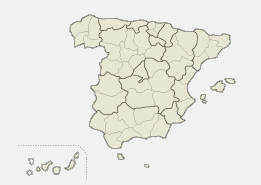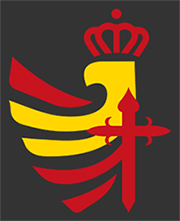- Home
- Feature Articles
- AEROPUERTO ASEGURADO
ENSURED AIRPORT
Friday, November 16, 2018
Number: 69
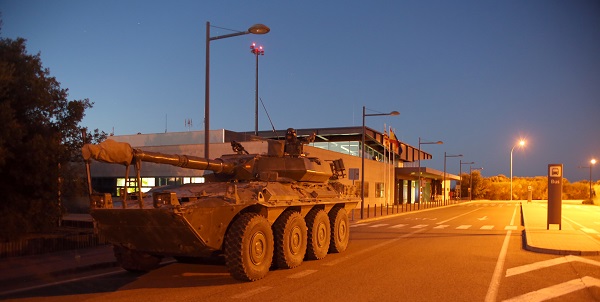
Cavalry advances taking advantage of the darkness of the night. The aim is to get to the Huesca-Pirineos Airport and establish a perimeter cordon that guarantees the safety of the whole precint before dawn. Real distances are not the same as those in the simulation exercises, so the squadrons will have to take into account the setbacks that may arise when moving along civil areas. It is the first time that the Zaragoza-based Light Armoured Cavalry Group 'Lanceros de Borbón' I, from the Cavalry Regiment 'España' no. 11 faces this situation in a real exercise.
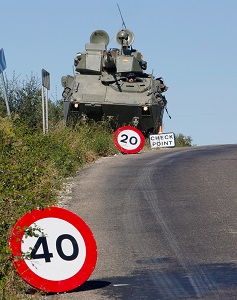
Between 2nd and 5th October, the squadrons deployed in the Hoya de Huesca area to conduct a tactical exercise to control the area, in which a security perimeter between six and eight kilometres around the airport had to be established. The exercise began with the reconnaissance of the area, in which the three squadrons advanced until the limit line was reached—materialised by the towns of Gurrea de Gállego, Grañén and Tardienta.
A new detachment for each group is deployed over these towns, apart from the Command Post, initially based in Almudévar.
«Each squadon ensures a certain area, so firstly, they will have to conduct reconnaissance and control exercises until the limit line is reached», claims lieutenant colonel Placer, chief of the “Lanceros de Borbón” group. For their part, the groups are also present in the towns. «We patrol around the cities, Tardienta, in our case. The aim is to guarantee safety and determine that there are no enemies in the area», highlights captain Sañudo, chief of the Armoured Squadron.
They work on an alleged deployment exercise in an allied area, from which the enemy is retreating. No direct offensive action is to be performed, it is just about advancing and providing safety with patrols, check point and observation posts.
Sergeant Feltrer, commanding one of the sections that have established a checkpoint, remarks that the exercise contributes to improving agility and, since they do as a group, to reach common goals. 'Every unit has a task, and they all belong to a common mission', the sergeant explains.
oth the Armoured Squadron, with Centauro vehicles, and the two Light Groups, with their Cavalry Exploration Vehicles (VEC) were the main protagonists of the night advance. 'It is crucial to perform reconnaissance of the paths, and follow the longitudinal and perpendicular routes', points out Captain Tundidor, chief of Group Operations.
Support from other units
In the development of the exercise, material and means support from the Artillery Campaign Regiment no. 11 and the Engineer Regiment no.1 becomes fundamental. Precisely the zappers' mission is key during the reconnaissance stage, to guarantee that the routes are clean and advance can be made along the canal. «We have recognised steps over the river and the main way», explains captain Herrero, at the command of the group located in the Western area. In that regard, he states that, even though they had had the chance to work on the area previosuly with the Steel Beats simulator, «it can help you get an idea, but there is nothing like stepping on the ground».
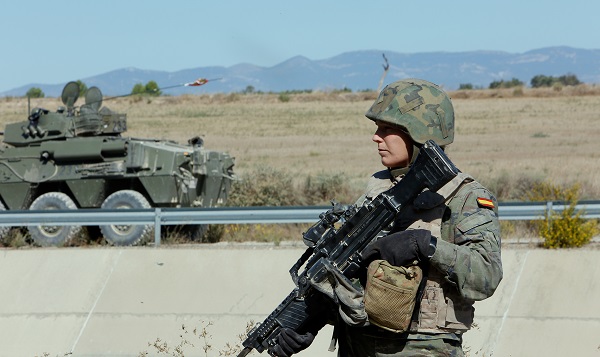
Pioneering exercise for the Group
It is the first time that the whole group conducts an exercise of this kind outside the manoeuvring area. «Everybody has to do previous and exhaustive work with the aid of maps. We can't just do what we like. These are the paths, and good reconnaissance must be conducted», asserts Captain Sañudo
At dawn, the Group reaches its target area, and they establish the perimeter around the Huesca-Pirineos Airport. The Command Post jumps to its final location in the near surroundings, while the two Light Squadrons perform the perimeter control, guaranteeing safety. For its part, the Armoured Squadron establishes two checkpoints, with two of its sections, to guarantee control in the access points. The third section is in reserve in case the enemy needs to be fought.
With the first lights of dawn, the objective is accomplished, and the Huesca-Pirineos Airport is ensured. The night has been long, bur the Group has been able to advance on the ground properly and, with around 370 soldiers, overcome a new challenge for the Regiment.
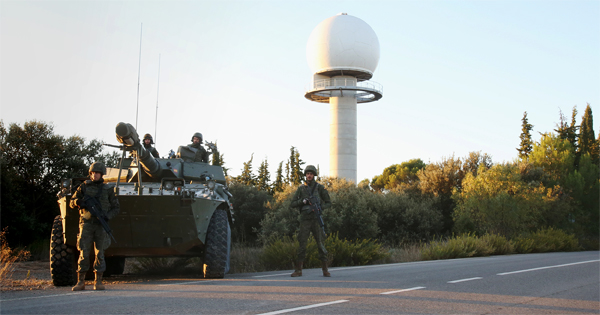
The culmination of this exercise was the setting up —as requested by the mayors of several towns— of a static exhibition of material, also as a way of thanking the civil population by the good treatment they received.
ARMY UNITS
- Araba Álava |
- Albacete |
- Alicante |
- Almería |
- Asturias |
- Ávila |
- Badajoz |
- Barcelona |
- Burgos |
- Cáceres |
- Cádiz |
- Cantabria |
- Castellón |
- Ceuta |
- Ciudad Real |
- Córdoba |
- A Coruña |
- Cuenca |
- Girona |
- Granada |
- Guadalajara |
- Gipuzkoa |
- Huelva |
- Huesca |
- Islas Baleares |
- Jaén |
- León |
- Lleida |
- Lugo |
- Madrid |
- Málaga |
- Melilla |
- Murcia |
- Navarra |
- Ourense |
- Palencia |
- Las Palmas |
- Pontevedra |
- La Rioja |
- Salamanca |
- Segovia |
- Sevilla |
- Soria |
- Tarragona |
- Santa Cruz de Tenerife |
- Teruel |
- Toledo |
- Valencia |
- Valladolid |
- Bizkaia |
- Zamora |
- Zaragoza
